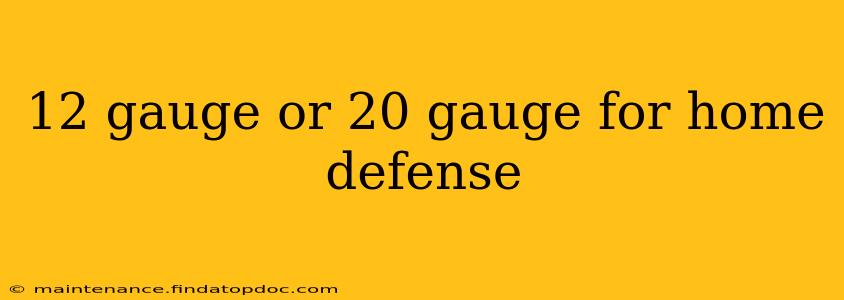12 Gauge vs. 20 Gauge for Home Defense: Choosing the Right Tool for the Job
Choosing a shotgun for home defense is a serious decision, demanding careful consideration of various factors. Two popular gauges often debated are 12 gauge and 20 gauge. Both offer effective stopping power, but their differences in recoil, capacity, and ammunition availability significantly impact their suitability for home defense. This guide will delve into the key aspects to help you make an informed choice.
What is the difference between a 12 gauge and a 20 gauge shotgun?
The most significant difference lies in the gauge, which refers to the diameter of the barrel. A 12-gauge shotgun has a larger bore than a 20-gauge, meaning it fires larger projectiles. This translates to more stopping power but also significantly more recoil. The 20-gauge offers less recoil, making it potentially easier to handle for smaller individuals or those less experienced with shotguns.
Which gauge is better for home defense: 12 gauge or 20 gauge?
There's no single definitive answer to this question. The "best" gauge depends heavily on the individual user's physical capabilities, experience, and the specific circumstances of their home defense situation.
12 Gauge Advantages:
- Greater Stopping Power: The larger shot size and payload deliver more devastating energy upon impact, potentially incapacitating a threat more quickly.
- Wider Availability of Ammunition: 12-gauge ammunition is more readily available and comes in a broader range of load types, including less-lethal options.
- Greater Variety of Shotguns: A much wider variety of 12-gauge shotguns are available, ranging in price, features, and styles.
12 Gauge Disadvantages:
- Significant Recoil: The powerful recoil can be challenging for smaller or less experienced shooters, potentially hindering accuracy and follow-up shots.
- Heavier Weight: 12-gauge shotguns tend to be heavier than their 20-gauge counterparts, making them more cumbersome to maneuver in tight spaces.
20 Gauge Advantages:
- Less Recoil: The reduced recoil makes it easier to control and shoot accurately, especially for multiple shots.
- Lighter Weight: Lighter weight enhances maneuverability, particularly beneficial in confined home environments.
- More Comfortable for Smaller Users: The reduced recoil makes it a more practical option for individuals with less upper body strength.
20 Gauge Disadvantages:
- Less Stopping Power: While still effective, the smaller shot size offers less stopping power than a 12-gauge, potentially requiring more precise shot placement.
- Reduced Ammunition Variety: While 20-gauge ammo is widely available, the variety is less extensive compared to 12-gauge.
What type of ammunition is best for home defense?
Regardless of gauge, choosing the right ammunition is crucial for home defense. Buckshot is generally preferred for its stopping power, offering multiple projectiles that spread upon impact. However, the potential for over-penetration must be considered. 00 Buckshot is a common choice, offering a good balance of stopping power and reduced over-penetration risk compared to larger buckshot sizes. Consider the construction of your home and neighboring structures when making this decision. Some may opt for birdshot for less-lethal options, but this reduces stopping power and might not be sufficient in a self-defense scenario.
Is a 20 gauge too weak for home defense?
No, a 20-gauge shotgun is not inherently "too weak" for home defense. With proper shot placement, it can be highly effective in stopping a threat. The reduced recoil allows for faster follow-up shots, potentially compensating for the slightly less stopping power compared to a 12-gauge.
What is the best shotgun for home defense for a woman?
The best shotgun for a woman (or anyone) depends on individual physical capabilities and preferences. A 20-gauge might be a better choice for those with less upper body strength due to reduced recoil, but a properly fitted 12-gauge might be manageable for some. Prioritize proper training and getting comfortable with the chosen firearm's recoil and handling.
Should I use slugs or buckshot for home defense?
Buckshot is generally recommended for home defense because of its ability to spread and potentially strike multiple vital areas. Slugs, while offering greater range and penetrating power, have a far smaller spread and are more likely to overpenetrate walls, posing a risk to occupants in adjacent rooms or neighbors.
Ultimately, the choice between a 12-gauge and a 20-gauge shotgun for home defense hinges on individual circumstances and priorities. Prioritize proper training and familiarize yourself thoroughly with your chosen firearm and ammunition before relying on it for self-defense. Consulting with experienced firearms instructors and law enforcement professionals can further assist in making an informed decision. Remember, responsible firearm ownership is paramount.
